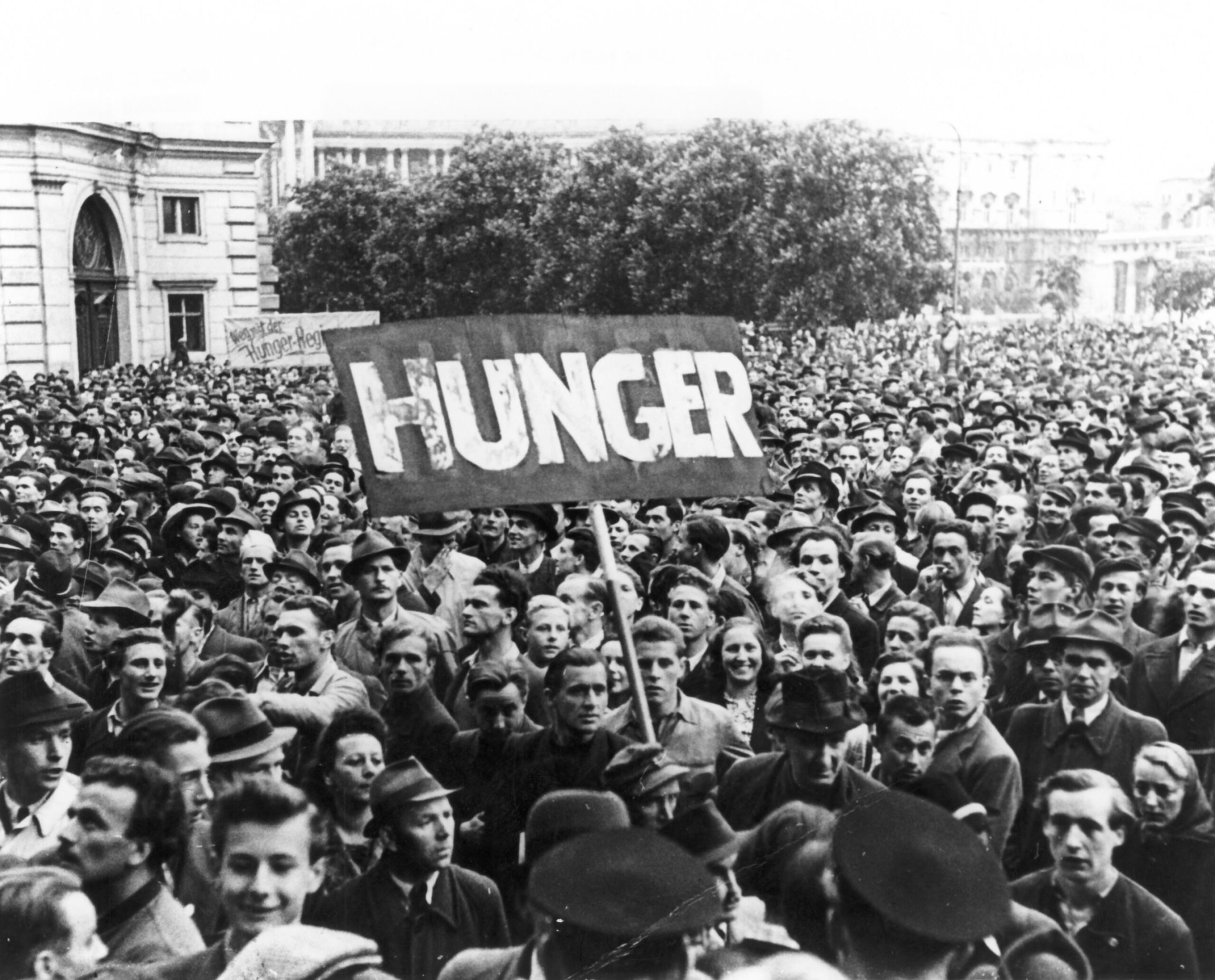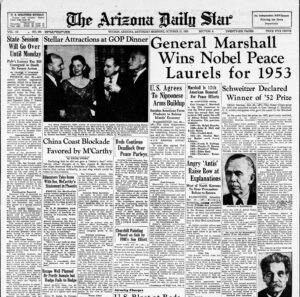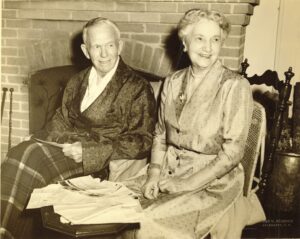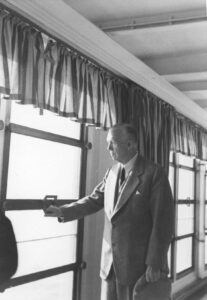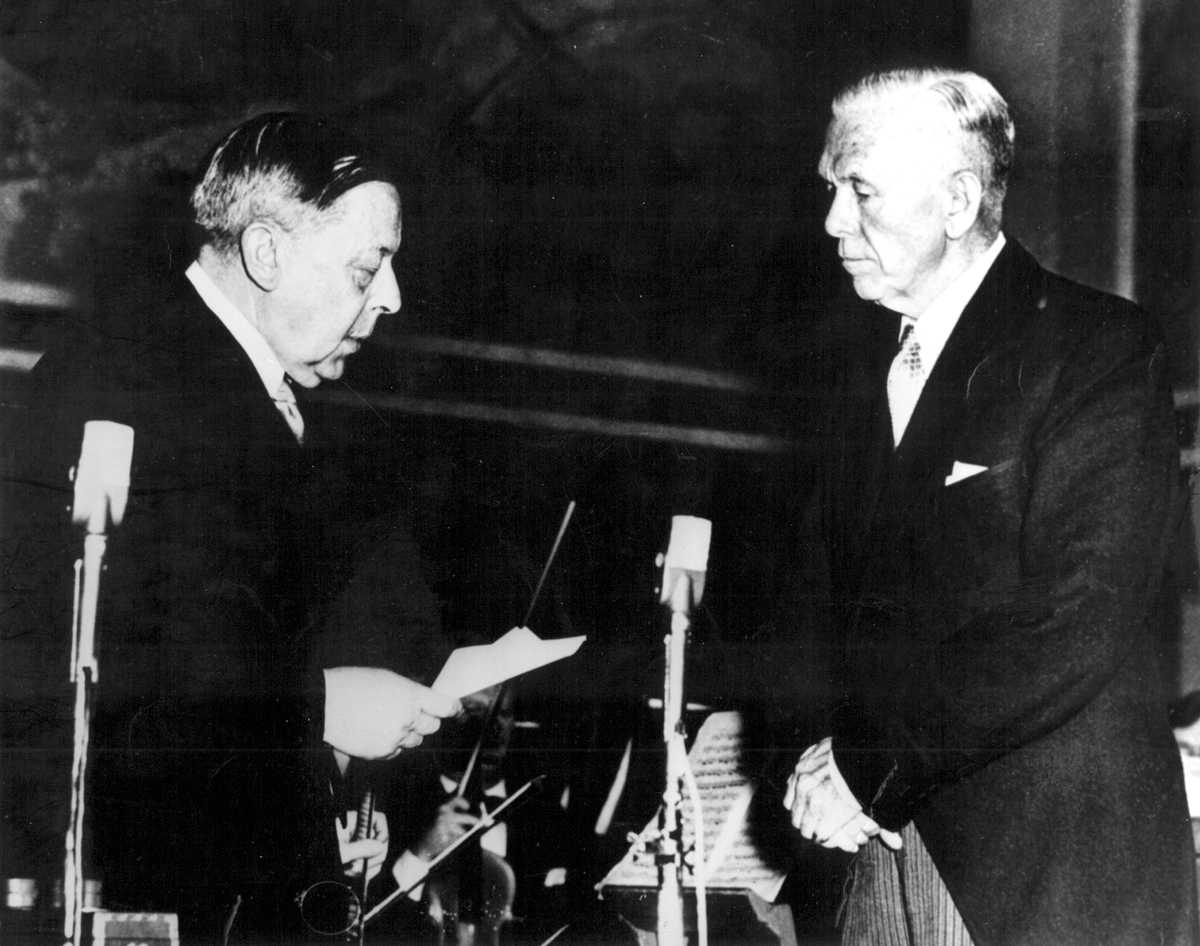70 years ago, George Catlett Marshall was awarded the Nobel Prize for Peace in Oslo, Norway. In this article, you will learn:
-
- How the Marshall Plan impacted Europe
- Why Marshall was awarded the Nobel Peace Prize
- How Marshall and his contemporaries reacted to his recognition by the Nobel committee
- What happened at the 1953 Nobel ceremony
- The contents of Marshall’s acceptance speech
- World War II devastated western Europe, and in spite of a brief rebound in industrial production immediately following the war, the continent was subjected to a harsh winter in 1946 and the continent’s worst harvest of the 20th century.
- Food, housing, fuel and money were scarce, and already-low morale among the populace worsened.
- Communist parties took advantage of the material insecurity of western Europe, using widespread dissatisfaction with capitalism’s apparent ineffectiveness in recovery to bolster their numbers, and in some cases (such as Greece) attempting to seize power outright.
- Secretary of State George C. Marshall grew alarmed after the 1947 Foreign Ministers Conference in Moscow, where the Soviet Union reneged on previous agreements about Europe’s recovery.
- Marshall recognized that failure to assist western Europe in its economic recovery in favor of American isolationism or punitive measures like those imposed on Germany in the Treaty of Versailles would leave the door open to a resurgence of totalitarianism.
- In 1947, Secretary of State George C. Marshall assembled a team of experts to develop ideas for helping European nations recover from World War II.
- Sixteen European countries hammered out the details of the plan and delivered it to the U.S. State Department.
- The country had only recently emerged from a war that pushed the federal budget into uncharted territory, taking on massive debt to wage a global conflict.
- There was wide sentiment in the public and in the halls of Congress that America had done its part and should focus on its own transition to a peacetime economy.
- Following months of campaigning, Marshall’s advocacy for economic recovery won favor with the public and members of Congress, and on April 3, 1948, President Harry S. Truman signed into law the Foreign Assistance Act of 1948, popularly known as the Marshall Plan.
- The United States sent $13.3 billion in aid to sixteen countries between 1948 and 1951.
Marshall's nomination
On October 30, 1953, Marshall found out that he had been awarded the Nobel Prize for Peace. He was bedridden with the flu when his wife, Katherine, received a phone call asking for a statement. The telegram from the Nobel Institute had been sent to their home in Leesburg, Virginia, and the Marshalls were currently in Pinehurst, North Carolina. Marshall told the New York Times “This award is a great distinction for which I am deeply grateful. While I have not received official notification, I assume from press dispatches that it is a fact.”
Congratulations came pouring in. Secretary of State Dean Acheson wrote:
“All of us in your former command–and I hope and believe, all people–are proud and happy. The award was right and proper and just. I hope that it has brought you and Mrs. Marshall some of the joy it has brought us.”
Marshall’s biographer Forrest C. Pogue writes that
[President] Truman, one of those who had proposed Marshall for the Peace Prize, was almost beside himself in his delight, some of which he expressed in an evening interview with Edward R. Murrow, which Marshall saw. He wrote the former President. “I watched it with considerable interest and, as you can well imagine, was deeply appreciative of the honor which you paid me. As usual, you were most generous and kind and, while the years pass into oblivion, I will never forget your unstinting support. . . .” About the Prize itself he added:
“While the award is individual in nature, it is, in effect, a tribute to the American people for their unselfish devotion to the welfare of free people everywhere. I hope you will share this distinction with me because it was through your guidance and leadership that the European Recovery Plan was made possible.”
On November 2, Marshall wrote the following letter to President Dwight D. Eisenhower:
Dear Mr. President: I am dictating this note as it is rather difficult to write legibly while I am confined to bed.
Mrs. Marshall conveyed your concern about my health…and good wishes on the Nobel Award. I am grateful for your interest and am glad to say that I am beginning to feel better.
I have had no official word on the arrangements incident to the presentation, but understand that the ceremony will be held…in December. I plan to go by ship and have decided on the Southern route to avoid heavy weather. Needless to say I was very much surprised by the announcement, and in accepting this recognition I do so on behalf of the American people, for it was they who made it possible.
You have been most gracious in your thoughts of me and I am grateful. I hope you will give Mrs. Eisenhower our warmest regards.
With great respect,
Faithfully yours,
G C Marshall
Voyage to Oslo
In spite of Katherine’s objections, the Marshalls boarded the Andrea Dorea for Naples. His doctors advised taking the southern route to Europe, believing the warmth and sun to be beneficial to Marshall’s condition. Biographer Forrest Pogue notes that
He thought his health would improve and he would have time on shipboard to write his speech. His hopes proved incorrect. As he later wrote Truman:
I had a most difficult time with the Oslo business. I left Water Reed and started on the trip. The ocean voyage was cold and damp which didn’t help matters. It was an eight day affair and I planned . to prepare my Oslo so-called lecture enroute. I found it utterly impossible to concentrate and I landed in Naples without a line. I flew up to [Paris] and there, in bed, the next morning I managed to dictate for an hour and a quarter, rather in desperation as my time was running out. (Pogue, Statesman, 505)
The Marshalls flew to Oslo from Paris on December 9, the day before the ceremony.
The Ceremony
Nobel Peace Prize Committee member C. J. Hambro lauded Marshall’s achievements as a soldier and statesman, paying particular attention to his work on the Marshall Plan and emphasizing that the award was given for his work towards peace rather than military accomplishments.
As Marshall began to present his speech, three men in the balcony began heckling the general and accusing him of war crimes. According to Pogue, Marshall “looked up calmly, and the King and his party rose to their feet, followed by the entire audience, to give the General a thunderous ovation. Members of the air crew that had flown Marshall to Oslo were sitting near the demonstrators. As no guards were near, the crew members seized the young men and rushed them out of the balcony where they were handed over to guards who had appeared.”
The Speech
-
Selections
“There has been considerable comment over the awarding of the Nobel Peace Prize to a soldier. I am afraid this does not seem as remarkable to me as it quite evidently appears to others. I know a great deal of the horrors and tragedies of war.”
“The cost of war in human lives is constantly spread before me, written neatly in many ledgers whose columns are gravestones. I am deeply moved to find some means or method of avoiding another calamity of war.”
“The guarantee for a long continued peace will depend on other factors in addition to a moderated military strength, and no less important. Perhaps the most important single factor will be a spiritual regeneration to develop good will, faith and understanding among nations.”
“I believe our students must first seek to understand the conditions, as far as possible without national prejudices, which have led to past tragedies and should strive to determine the great fundamentals which must govern a peaceful progression toward a constantly higher level of civilization.”
“If we act with wisdom and magnanimity, we can guide these yearnings of the poor to a richer and better life through democracy.”
“Tyranny inevitably must retire before the tremendous moral strength of the gospel of freedom and self-respect for the individual, but we have to recognize that these democratic principles do not flourish on empty stomachs and that people turn to false promises of dictators because they are hopeless and anything promises something better than the miserable existence that they endure.”
“I have done my best, and I hope I have sown some seeds which may bring forth good fruit.”
-
Full text
I have been greatly and surprisingly honored in the past twenty-four hours, and in return I have been requested to speak here tonight. While no subject has been suggested, it is quite evident that the cause of peace is preeminent in your minds.
Discussions without end have been devoted to the subject of peace, and the efforts to obtain a general and lasting peace have been frequent through many years of world history. There has been success temporarily, but all have broken down, and with the most tragic consequences since 1914. What I would like to do is point our attention to some directions in which efforts to attain peace seem promising of success.
I will try to phrase my views or suggestions in the simplest possible terms though I lack the magic and artistry of that great orator whom the Nobel Committee in Stockholm so appropriately honored yesterday. In making my statement I will assume your familiarity with the discussions and efforts of the past eight years and also with something of the conditions which have governed each long continued peace in world history.
I would like to make special mention of the years of the Pax Romana, which endured through almost all of the first two centuries of the Christian era. I do so because of a personal incident which made a profound impression on me in the spring of 1919. Arriving late at night in Chaumont, the American Headquarters in France, I sought shelter for the night in the house of a group of friends. I found they were temporarily absent; so I selected an unoccupied room and looked about for a book to read as I waited for sleep to come. The books available were mostly in French or German. Since I was unable to read them with facility, I looked further and finally found an English textbook on the history of Gaul. Casting about for an interesting portion, I landed on a description of the famous Roman Peace. Included in this description was a statement of the dispositions of the Roman troops during this prolonged period, a legion at Cologne, another at Coblenz, a third at Mayence, and the reserve at Trier. Now those happened to be the identical dispositions of our Allied Forces some eighteen hundred years later, with the Peace Commission sitting in Paris and evolving the policy of the League of Nations.
I would not wish to imply that the military deployment I have just described corresponds to the protective NATO deployment of today. The threat today is quite different, but I do think that this remarkable historical repetition does suggest that we have walked blindly, ignoring the lessons of the past, with, in our century, the tragic consequences of two world wars and the Korean struggle as a result.
In my country my military associates frequently tell me that we Americans have learned our lesson. I completely disagree with this contention and point to the rapid disintegration between 1945 and 1950 of our once vast power for maintaining the peace. As a direct consequence, in my opinion, there resulted the brutal invasion of South Korea, which for a time threatened the complete defeat of our hastily arranged forces in that field. I speak of this with deep feeling because in 1939 and again in the early fall of 1950 it suddenly became my duty, my responsibility, to rebuild our national military strength in the very face of the gravest emergencies.
These opening remarks may lead you to assume that my suggestions for the advancement of world peace will rest largely on military strength. For the moment the maintenance of peace in the present hazardous world situation does depend in very large measure on military power, together with Allied cohesion. But the maintenance of large armies for an indefinite period is not a practical or a promising basis for policy. We must stand together strongly for these present years, that is, in this present situation; but we must, I repeat, we must find another solution, and that is what I wish to discuss this evening.
There has been considerable comment over the awarding of the Nobel Peace Prize to a soldier4. I am afraid this does not seem as remarkable to me as it quite evidently appears to others. I know a great deal of the horrors and tragedies of war. Today, as chairman of the American Battle Monuments Commission, it is my duty to supervise the construction and maintenance of military cemeteries in many countries overseas, particularly in Western Europe. The cost of war in human lives is constantly spread before me, written neatly in many ledgers whose columns are gravestones. I am deeply moved to find some means or method of avoiding another calamity of war. Almost daily I hear from the wives, or mothers, or families of the fallen. The tragedy of the aftermath is almost constantly before me.
I share with you an active concern for some practical method for avoiding war. Let me first say that I regard the present highly dangerous situation as a very special one, which naturally dominates our thinking on the subject of peace, but which should not, in my opinion, be made the principal basis for our reasoning towards the manner for securing a condition of long continued peace. A very strong military posture is vitally necessary today. How long it must continue I am not prepared to estimate, but I am sure that it is too narrow a basis on which to build a dependable, long-enduring peace. The guarantee for a long continued peace will depend on other factors in addition to a moderated military strength, and no less important. Perhaps the most important single factor will be a spiritual regeneration to develop goodwill, faith, and understanding among nations. Economic factors will undoubtedly play an important part. Agreements to secure a balance of power, however disagreeable they may seem, must likewise be considered. And with all these there must be wisdom and the will to act on that wisdom.
In this brief discussion, I can give only a very limited treatment of these great essentials to peace. However, I would like to select three more specific areas for closer attention.
The first relates to the possibilities of better education in the various factors affecting the life of peaceful security, both in terms of its development and of its disruption. Because wisdom in action in our Western democracies rests squarely upon public understanding, I have long believed that our schools have a key role to play. Peace could, I believe, be advanced through careful study of all the factors which have gone into the various incidents now historical that have marked the breakdown of peace in the past. As an initial procedure our schools, at least our colleges but preferably our senior high schools, as we call them, should have courses which not merely instruct our budding citizens in the historical sequence of events of the past, but which treat with almost scientific accuracy the circumstances which have marked the breakdown of peace and have led to the disruption of life and the horrors of war.
There may perhaps have been a “last clear chance” to avoid the tragic conflagrations of our century. In the case of World War II, for example, the challenge may well have come in the early thirties, and passed largely unrecognized until the situation was unlikely to be retrieved. We are familiar with specific events such as the march into the Rhineland or aggression in Ethiopia or Manchuria. Perhaps there was also a last clear chance to begin to build up the strength of the democracies to keep the military situation in equilibrium. There may also have been a last clear chance to penetrate to the spirit of the peoples of the nations threatening the peace, and to find ways of peaceful adjustment in the economic field as well. Certainly, had the outcome of the war, with its devastation and disruption, been foreseen, and had there been an understanding on all sides of the problems that were threatening the peace, I feel sure that many possibilities for accommodation would have been much more thoroughly explored.
It is for this reason that I believe our students must first seek to understand the conditions, as far as possible without national prejudices, which have led to past tragedies and should strive to determine the great fundamentals which must govern a peaceful progression toward a constantly higher level of civilization. There are innumerable instructive lessons out of the past, but all too frequently their presentation is highly colored or distorted in the effort to present a favorable national point of view. In our school histories at home, certainly in years past, those written in the North present a strikingly different picture of our Civil War from those written in the South. In some portions it is hard to realize they are dealing with the same war. Such reactions are all too common in matters of peace and security. But we are told that we live in a highly scientific age. Now the progress of science depends on facts and not fancies or prejudice. Maybe in this age we can find a way of facing the facts and discounting the distorted records of the past.
I am certain that a solution of the general problem of peace must rest on broad and basic understanding on the part of its peoples. Great single endeavors like a League of Nations, a United Nations, and undertakings of that character, are of great importance and in fact absolutely necessary, but they must be treated as steps toward the desired end.
We must depend in large measure on the impartiality of those who teach. Their approach must be on a scientific basis in order to present the true facts. The scientists, no matter of what nationality, make a common approach to their problems.
For my second suggestion, I would like to consider the national attitudes that bear on the great problem of peace. I hope you will not think me amiss if I turn to my own country and certain rather special circumstances found there to illustrate my point. Despite the amazing conquest of the air and its reduction of distances to a matter of hours and not days, or minutes instead of hours, the United States is remote in a general sense from the present turbulent areas of the world. I believe the measure of detachment, limited though it is, has been of help in enabling us on occasion to take an impartial stand on heated international problems.
Also, my country is very specially constituted in terms of population. We have many families of Norwegian ancestry in our population. My country also includes large numbers of former citizens of many of the other countries of Europe, including the present satellite states. I recall that when the first Polar flight was made by the Russians from Moscow over the top of the world to land on the little airfield of the post I commanded at Vancouver on the Columbia River in the state of Washington, my home was surrounded within a few hours by hundreds and hundreds of Russians, all presumably citizens of the United States. Italians, Turks, Greeks, and many, many others who came to our country now constitute an organic portion of our population.
From this fact we have acquired, I think, a feeling and a concern for the problems of other peoples. There is a deep urge to help the oppressed and to give aid to those upon whom great and sudden hardship has fallen.
We, naturally, cannot see a problem in the exact terms as people like yourselves or the Danes, or the Dutch, or the French, for example – people living in the closest contact with each other, yet widely differing in national heritage. I believe there is, however, a readiness to cooperate which is one of the great and hopeful factors of the world of today. While we are not in close contact with the details of problems, neither are we indifferent to them, and we are not involved in your historical tensions and suspicions.
If I am correct in thinking that these factors have given us as a nation some advantage in the quest for peace, then I would suggest that principles of cooperation based on these factors might contribute to a better understanding amongst all nations.
I realize fully that there is another side to this picture. In America we have not suffered the destruction of our homes, our towns, and our cities. We have not been enslaved for long periods, at the complete mercy of a conqueror. We have enjoyed freedom in its fullest sense. In fact, we have come to think in terms of freedom and the dignity of the individual more or less as a matter of course, and our apparent unconcern until times of acute crisis presents a difficult problem to the citizens of the countries of Western Europe, who have seldom been free from foreign threat to their freedom, their dignity, and their security. I think nevertheless that the people of the United States have fully demonstrated their willingness to fight and die in the terrible struggle for the freedom we all prize, to sacrifice their own men in large numbers for this common cause, and to contribute vast sums for the general benefit of the Western countries.
I recognize that there are bound to be misunderstandings under the conditions of wide separation between your countries and mine. But I believe the attitude of cooperation has been thoroughly proven. I also believe that the participation of millions of our young men and women in the struggle in Western Europe, in the closest contact with your people, will bring as its result less of misunderstanding on our side of the Atlantic than perhaps on yours.
In my own case, for example, I spent two and one half years in France during the First World War. Frequently I was quartered in the households of the French peasantry and spent long evenings by the kitchen fires, talking far into the night. I came to know them well, admired them, and in some cases came to love them. Now, how many do you suppose of the present citizens of Western Europe have had a similar look-in on the homes of people in the farms and small towns of America. A few may know much of New York, Washington, and Chicago, but those great cities do not represent the heart of America.
The third area I would like to discuss has to do with the problem of the millions who live under subnormal conditions and who have now come to a realization that they may aspire to a fair share of the God-given rights of human beings. Their aspirations present a challenge to the more favored nations to lend assistance in bettering the lot of the poorer. This is a special problem in the present crisis, but it is of basic importance to any successful effort toward an enduring peace. The question is not merely one of self-interest arising from the fact that these people present a situation which is a seed bed for either one or the other of two greatly differing ways of life. Ours is democracy, according to our interpretation of the meaning of that word. If we act with wisdom and magnanimity, we can guide these yearnings of the poor to a richer and better life through democracy.
We must present democracy as a force holding within itself the seeds of unlimited progress by the human race. By our actions we should make it clear that such a democracy is a means to a better way of life, together with a better understanding among nations. Tyranny inevitably must retire before the tremendous moral strength of the gospel of freedom and self-respect for the individual, but we have to recognize that these democratic principles do not flourish on empty stomachs, and that people turn to false promises of dictators because they are hopeless and anything promises something better than the miserable existence that they endure. However, material assistance alone is not sufficient. The most important thing for the world today in my opinion is a spiritual regeneration which would reestablish a feeling of good faith among men generally. Discouraged people are in sore need of the inspiration of great principles. Such leadership can be the rallying point against intolerance, against distrust, against that fatal insecurity that leads to war. It is to be hoped that the democratic nations can provide the necessary leadership.
The points I have just discussed are, of course, no more than a very few suggestions in behalf of the cause of peace. I realize that they hold nothing of glittering or early promise, but there can be no substitute for effort in many fields. There must be effort of the spirit – to be magnanimous, to act in friendship, to strive to help rather than to hinder. There must be effort of analysis to seek out the causes of war and the factors which favor peace, and to study their application to the difficult problems which will beset our international intercourse. There must be material effort – to initiate and sustain those great undertakings, whether military or economic, on which world equilibrium will depend.
If we proceed in this manner, there should develop a dynamic philosophy which knows no restrictions of time or space. In America we have a creed which comes to us from the deep roots of the past. It springs from the convictions of the men and women of many lands who founded the nation and made it great. We share that creed with many of the nations of the Old World and the New with whom we are joined in the cause of peace. We are young in world history, but these ideals of ours we can offer to the world with the certainty that they have the power to inspire and to impel action.
I am not implying in any way that we would attempt to persuade other people to adopt our particular form of government. I refer here specifically to those fundamental values on which our government, like many other democracies, is based. These, I believe, are timeless and have a validity for all mankind. These, I believe, will kindle the imagination and arouse the spirit.
A great proponent of much of what I have just been saying is Dr. Albert Schweitzer, the world humanitarian, who today receives the Nobel Peace Award for 1952. I feel it is a vast compliment to be associated with him in these awards this year. His life has been utterly different from mine, and we should all be happy that his example among the poor and benighted of the earth should have been recognized by the Peace Award of the Nobel Committee.
I must not further complicate this discussion with the wide variety of specific considerations which will enfold the gradual growth of a sound approach toward some method of securing an enduring peace in the world. I fear, in fact I am rather certain, that due to my inability to express myself with the power and penetration of the great Churchill, I have not made clear the points that assume such prominence and importance in my mind. However, I have done my best, and I hope I have sown some seeds which may bring forth good fruit.
The Prize
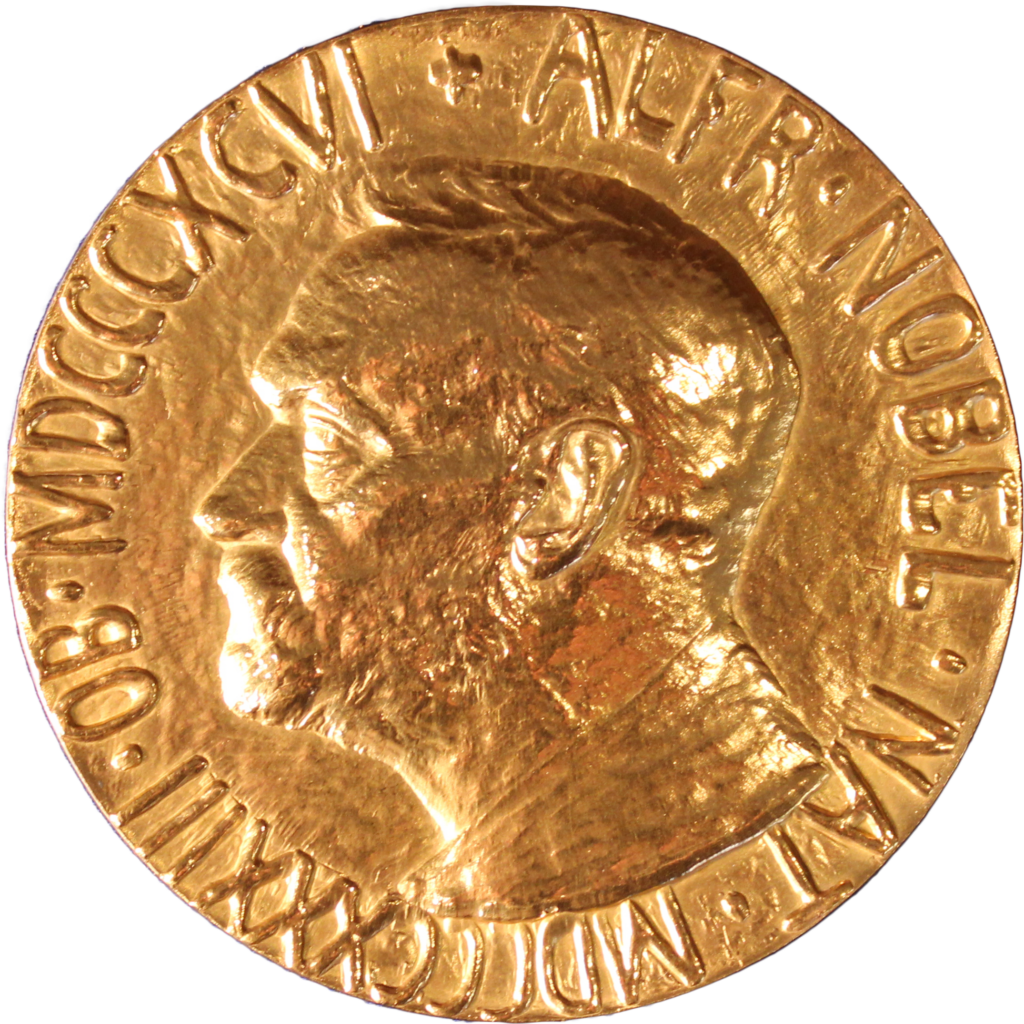 Marshall’s Nobel Prize for Peace was loaned by the family to the George C. Marshall Foundation in May 1964. It is currently on permanent display at the Foundation building in Lexington, Virginia.
Marshall’s Nobel Prize for Peace was loaned by the family to the George C. Marshall Foundation in May 1964. It is currently on permanent display at the Foundation building in Lexington, Virginia.
Sources
Machado, B. (2007). In search of a usable past: The Marshall Plan and postwar reconstruction today. George C. Marshall Foundation.
Glen J. Carpenter is Director of Communications and Multimedia. He began working at the George C. Marshall Foundation in 2018. His background is in American studies (focusing on film, music, and twentieth-century consumer culture) and video production. He lives in Roanoke, Virginia.

